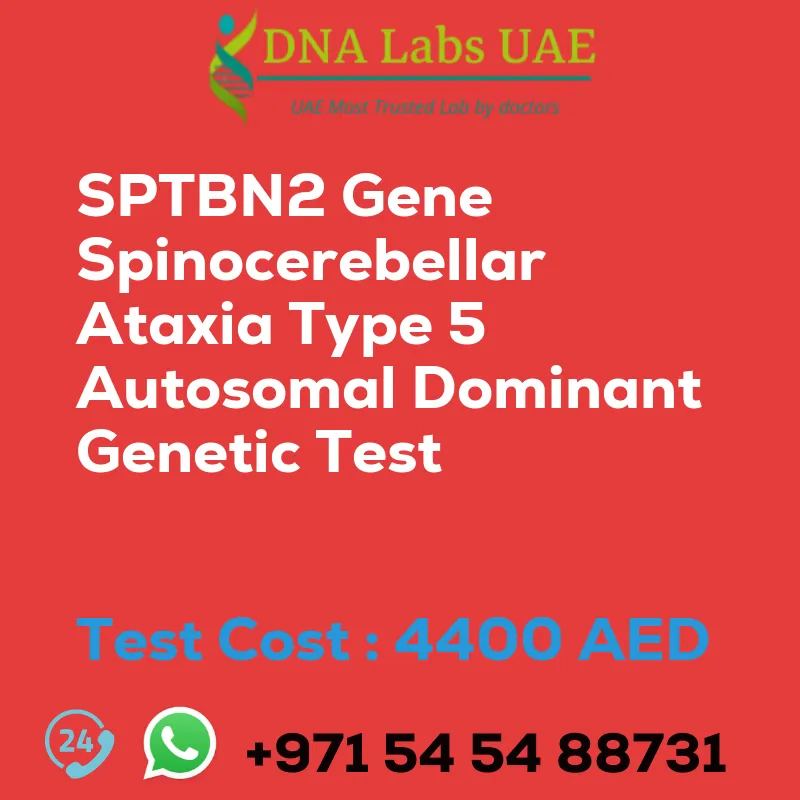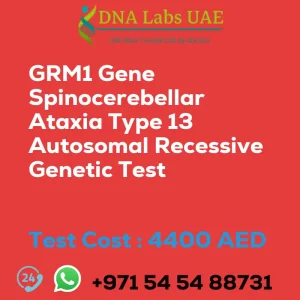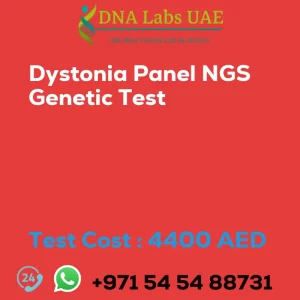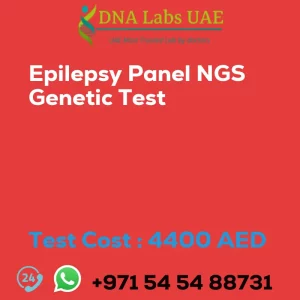SPTBN2 Gene Spinocerebellar Ataxia Type 5 Autosomal Dominant Genetic Test
Test Details
Spinocerebellar ataxia type 5 (SCA5) is a rare genetic disorder that affects the cerebellum and spinal cord. It is an autosomal dominant condition, meaning that an individual only needs to inherit one copy of the mutated gene from either parent to develop the disease. The SPTBN2 gene is associated with SCA5. Mutations in this gene result in the production of an abnormal beta-III spectrin protein, which disrupts the normal functioning of neurons in the cerebellum and spinal cord.
NGS (Next-Generation Sequencing) genetic testing is a technique used to analyze multiple genes simultaneously, allowing for a comprehensive evaluation of an individual’s genetic makeup. In the context of SCA5, NGS genetic testing can be used to identify mutations in the SPTBN2 gene, providing a diagnosis for individuals suspected of having the condition. The test involves obtaining a DNA sample, typically through a blood or saliva sample, and sequencing the DNA to identify any mutations or variations in the SPTBN2 gene.
The results of the test can help confirm a diagnosis of SCA5 and provide valuable information for genetic counseling and management of the condition. It’s important to note that genetic testing for SCA5 is typically only recommended for individuals who have symptoms consistent with the condition or have a family history of SCA5. Genetic testing should be done under the guidance of a healthcare professional or genetic counselor who can provide appropriate counseling and interpretation of the results.
Test Name: SPTBN2 Gene Spinocerebellar Ataxia Type 5 Autosomal Dominant Genetic Test
Components
- Price: 4400.0 AED
Sample Condition
- Blood or Extracted DNA or One drop Blood on FTA Card
Report Delivery
- 3 to 4 Weeks
Method
- NGS Technology
Test Type
- Neurological Disorders
Doctor
- Neurologist
Test Department
- Genetics
Pre Test Information
Clinical History of Patient who is going for SPTBN2 Gene Spinocerebellar Ataxia Type 5, autosomal dominant NGS Genetic DNA Test
A Genetic Counselling session to draw a pedigree chart of family members affected with SPTBN2 Gene Spinocerebellar Ataxia Type 5, autosomal dominant
| Test Name | SPTBN2 Gene Spinocerebellar ataxia type 5 autosomal dominant Genetic Test |
|---|---|
| Components | |
| Price | 4400.0 AED |
| Sample Condition | Blood or Extracted DNA or One drop Blood on FTA Card o |
| Report Delivery | 3 to 4 Weeks |
| Method | NGS Technology |
| Test type | Neurological Disorders |
| Doctor | Neurologist |
| Test Department: | Genetics |
| Pre Test Information | Clinical History of Patient who is going for SPTBN2 Gene Spinocerebellar ataxia type 5, autosomal dominant NGS Genetic DNA Test A Genetic Counselling session to draw a pedigree chart of family members affected with SPTBN2 Gene Spinocerebellar ataxia type 5, autosomal dominant |
| Test Details |
Spinocerebellar ataxia type 5 (SCA5) is a rare genetic disorder that affects the cerebellum and spinal cord. It is an autosomal dominant condition, meaning that an individual only needs to inherit one copy of the mutated gene from either parent to develop the disease. The SPTBN2 gene is associated with SCA5. Mutations in this gene result in the production of an abnormal beta-III spectrin protein, which disrupts the normal functioning of neurons in the cerebellum and spinal cord. NGS (Next-Generation Sequencing) genetic testing is a technique used to analyze multiple genes simultaneously, allowing for a comprehensive evaluation of an individual’s genetic makeup. In the context of SCA5, NGS genetic testing can be used to identify mutations in the SPTBN2 gene, providing a diagnosis for individuals suspected of having the condition. The test involves obtaining a DNA sample, typically through a blood or saliva sample, and sequencing the DNA to identify any mutations or variations in the SPTBN2 gene. The results of the test can help confirm a diagnosis of SCA5 and provide valuable information for genetic counseling and management of the condition. It’s important to note that genetic testing for SCA5 is typically only recommended for individuals who have symptoms consistent with the condition or have a family history of SCA5. Genetic testing should be done under the guidance of a healthcare professional or genetic counselor who can provide appropriate counseling and interpretation of the results. |








